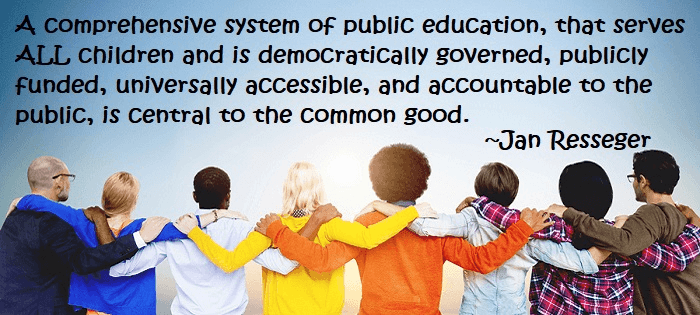Public School Educators
From Public Education Platform
All children deserve a quality public education and equitable public schools. Unfortunately, so-called education reform often stands in the way of this lofty goal.
In recent years, traditional public schools have suffered with an unreasonable number of education mandates dealing with high-stakes testing, “school choice” vouchers, unaccountable charter schools, and other mandates which compete for district resources already diminished by drastic budget cuts.
Students have never been under more developmentally inappropriate and highly stressful policies than what we see in our public schools today.
Because of these issues that hurt children and families, as well as their local school districts, Public Education Platform recommends the following platform, inspired by Jan Resseger of the Heights Coalition for Public Education.
PUBLIC EDUCATION PLATFORM:
•Provide adequate and equitable funding to public school districts to guarantee a comparable opportunity to learn for ALL children. This includes a quality early childhood education, qualified teachers, a rich curriculum that will prepare students for college, work and community, and equitable instructional resources.
•Respect local control of public schools run by elected school boards. There are different needs for different schools of different sizes, and each local school board knows what its students, families, and community values.
•Reject the school privatization agenda, which includes state takeovers, charter schools, voucher schemes, and high-stakes testing. The school privatization agenda has proven to be ineffective at bringing efficiency and cost savings to our schools.
•Do away with the state takeovers of school districts. State takeovers of school districts, followed by the appointment of CEOs with power to override the decisions of elected school boards and nullify union contracts, are undemocratic, unaccountable, and without checks and balances.
•Promote a moratorium on the authorization of new charter schools while gradually removing existing charters, which take funding and other valuable resources from public school districts. Charter schools remove funds and other resources from public school districts and need to be phased out. For-profit charter schools should be eliminated – tax dollars should never be transferred into private profits.
•Eliminate vouchers and tuition tax credit programs. Voucher schemes take desperately needed dollars out of education budgets and undermine the protection of religious liberty as defined by the First Amendment.
•Encourage wraparound community learning centers that bring social and health services into public school buildings. These wraparound services ensure that the public schools are the center of the neighborhood, and they include health, dental, and mental health clinics, after school programs, and parent support programs.
•End the test-and-punish philosophy, and replace it with an ideology of school investment and improvement. The tests have narrowed the curriculum to the tested subjects. If national standardized testing is to continue, testing should be limited to the federal minimum guidelines, and there should be no state standardized tests beyond those mandated by ESSA.
•Remove high stakes mandates from schools, and abolish the practice of punishing schools, teachers, families, and students for arbitrary test scores. Do away with mandatory retention attached to the 3rd Grade Reading Guarantee and high school end-of-course state tests. If parents choose to opt their children out of testing, no one should be penalized.
•Restore respect for well-trained, certified teachers, and return educator evaluation systems to locally elected school boards. Dismiss Teach for America, which is funded by the Eli Broad Foundation and the Walton Family Foundation. Eliminate the practice of using student test scores to evaluate teachers.
Source: publiceducationpartners.org “Public Education Platform,” Public Education Partners
From 10 Challenges Facing Public Education Today
As of the 2017 – 2018 school year, at least 12 states had slashed “general” or “formula” funding—the primary form of state support for elementary and secondary schools—by 7 percent or more per student over the last decade, according to the Center on Budget and Policy Priorities. Seven of the states—Arizona, Idaho, Kansas, Michigan, Mississippi, North Carolina, and Oklahoma—enacted tax cuts costing tens or hundreds of millions of dollars each year, instead of restoring education funding.
Source: nea.org NEA News, “10 Challenges Facing Public Education Today,” 08/03/2018
From Classroom Censorship Hurts Students
Classroom censorship policies are designed to control and limit the free speech and ideas of teachers and students. Such policies deprive students and teachers of the skills, the knowledge and the confidence to have critical conversations in the classroom.
This hurts all students’ ability to understand themselves and their shared place in our democracy, especially for students of color who are the majority of our student population. And it directly harms Black, Indigenous, Latino, and other marginalized students who already experience racism, marginalization, and systemic oppression.
Source: idra.org Intercultural Development Research Association, “Classroom Censorship Hurts Students,” Nov 22 2022
From A Reuters Special Report: School boards get death threats amid rage over race, gender, mask policies
Local school officials across the United States are being inundated with threats of violence and other hostile messages from anonymous harassers nationwide, fueled by anger over culture-war issues. Reuters found 220 examples of such intimidation in a sampling of districts.
The letter came to the home of Brenda Sheridan, a Loudoun County, Virginia school board member, addressed to one of her adult children. It threatened to kill them both unless she left the board.
“It is too bad that your mother is an ugly communist whore,” said the hand-scrawled note, which the family read just after Christmas. “If she doesn’t quit or resign before the end of the year, we will kill her, but first, we will kill you!”
School board members across the United States have endured a rash of terroristic threats and hostile messages ignited by roiling controversies over policies on curtailing the coronavirus, bathroom access for transgender students and the teaching of America’s racial history.
Reuters documented the intimidation through contacts and interviews with 33 board members across 15 states and a review of threatening and harassing messages obtained from the officials or through public records requests. The news organization found more than 220 such messages in this sampling of districts. School officials or parents in 15 different counties received or witnessed threats they considered serious enough to report to police.
While school controversies are traditionally local, these threats often come from people out of state with no connection to the districts involved. They are part of a rising national wave of threats to public officials – including election officials and members of Congress – citing an array of grievances, often underpinned by apocalyptic conspiracy theories alleging “treason” or “tyranny.”
Source: reuters.com “A Reuters Special Report: School boards get death threats amid rage over race, gender, mask policies,”
by Gabriella Borter, Joseph Ax And Joseph Tanfani, Feb. 15, 2022Thank you for supporting peacebuilding and the Miami Valley Peace Heroes Trail!
